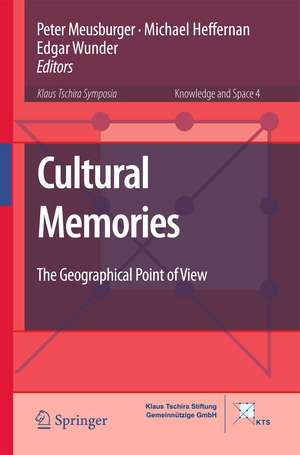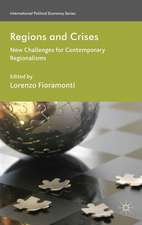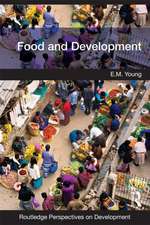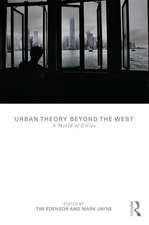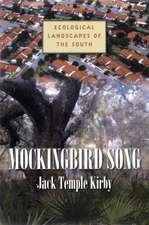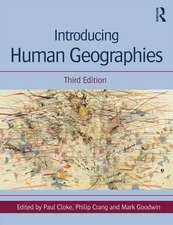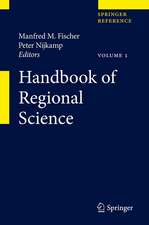Cultural Memories: The Geographical Point of View: Knowledge and Space, cartea 4
Editat de Peter Meusburger, Michael Heffernan, Edgar Wunderen Limba Engleză Paperback – 15 iul 2013
| Toate formatele și edițiile | Preț | Express |
|---|---|---|
| Paperback (1) | 949.10 lei 6-8 săpt. | |
| SPRINGER NETHERLANDS – 15 iul 2013 | 949.10 lei 6-8 săpt. | |
| Hardback (1) | 953.65 lei 6-8 săpt. | |
| SPRINGER NETHERLANDS – 12 mai 2011 | 953.65 lei 6-8 săpt. |
Din seria Knowledge and Space
-
 Preț: 401.57 lei
Preț: 401.57 lei -
 Preț: 431.94 lei
Preț: 431.94 lei -
 Preț: 281.52 lei
Preț: 281.52 lei -
 Preț: 181.58 lei
Preț: 181.58 lei -
 Preț: 293.36 lei
Preț: 293.36 lei -
 Preț: 295.37 lei
Preț: 295.37 lei -
 Preț: 402.38 lei
Preț: 402.38 lei - 18%
 Preț: 1383.49 lei
Preț: 1383.49 lei -
 Preț: 394.44 lei
Preț: 394.44 lei -
 Preț: 431.73 lei
Preț: 431.73 lei -
 Preț: 376.24 lei
Preț: 376.24 lei -
 Preț: 396.53 lei
Preț: 396.53 lei - 18%
 Preț: 1114.52 lei
Preț: 1114.52 lei - 18%
 Preț: 943.88 lei
Preț: 943.88 lei - 18%
 Preț: 950.66 lei
Preț: 950.66 lei - 15%
 Preț: 644.95 lei
Preț: 644.95 lei - 15%
 Preț: 649.87 lei
Preț: 649.87 lei -
 Preț: 429.61 lei
Preț: 429.61 lei -
 Preț: 92.91 lei
Preț: 92.91 lei
Preț: 949.10 lei
Preț vechi: 1157.44 lei
-18% Nou
Puncte Express: 1424
Preț estimativ în valută:
181.61€ • 189.61$ • 150.31£
181.61€ • 189.61$ • 150.31£
Carte tipărită la comandă
Livrare economică 04-18 aprilie
Preluare comenzi: 021 569.72.76
Specificații
ISBN-13: 9789400736030
ISBN-10: 9400736037
Pagini: 392
Ilustrații: VIII, 384 p.
Dimensiuni: 155 x 235 x 21 mm
Greutate: 0.55 kg
Ediția:2011
Editura: SPRINGER NETHERLANDS
Colecția Springer
Seria Knowledge and Space
Locul publicării:Dordrecht, Netherlands
ISBN-10: 9400736037
Pagini: 392
Ilustrații: VIII, 384 p.
Dimensiuni: 155 x 235 x 21 mm
Greutate: 0.55 kg
Ediția:2011
Editura: SPRINGER NETHERLANDS
Colecția Springer
Seria Knowledge and Space
Locul publicării:Dordrecht, Netherlands
Public țintă
ResearchCuprins
Part I: Theoretical considerations: Communicative and Cultural Memory: Jan Assmann, Memory and Space in the Work of Maurice Halbwachs: David Middleton, Steven D. Brown, Disparities between Knowledge and Collective Memories: Peter Meusburger, Part II: Case Studies, The Rütli in Switzerland: minor memory – major ambition: Georg Kreis, Sharing Space? Geography and Politics in Post-conflict Northern Ireland : Brian Graham, Memory—Recollection—Culture—Identity—Space: Social Context, Identity Formation, and Self-construction of the Calé (Gitanos) in Spain: Christina West, Part III: World War II in European Cultural Memories: Seven Circles of European Memory: Claus Leggewie, Halecki Revisited: Europe’s Conflicting Cultures of Remembrance: Stefan Troebst, “Remembering for whom? Concepts for memorials in Western Europe": Rainer Eckert, Family Memories of World War II and the Holocaust in Europe, orIs There a European Memory?: Harald Welzer, Annihilating—Preserving—Remembering: The “Aryanization” of Jewish History and Memory during the Holocaust: Dirk Rupnow, History/Archive/Memory: A Historical Geography of the U.S. Naval Memorial in Brest, France: Michael Heffernan, Places and Spaces: The Remembrance of D-Day 1944 in Normandy: Sandra Petermann, “Doors into Nowhere”: Dead Cities and the Natural History of Destruction: Derek Gregory, Part IV: Postcolonial Cultural Memories, Violent Memories: South Asian Spaces of Postcolonial Anamnesis: Stephen Legg, Spacing Forgetting: The Birth of the Museum at Fort Jesus, Mombasa, and the Legacies of the Colonization of Memory in Kenya: Denis Linehan, Joao Sarmento: Part V: Pre-modern Cultural Memories: Landscape, Transformations and Immutability in an Aboriginal Australian Culture: Robert Tonkinson, Person, Space, and Memory. Why Anthropology needs Cognitive Science and Human Geography: Jürg Wassmann, Abstracts of the Contributions, The Klaus Tschira Foundation, Index
Recenzii
“This book is a worthy testament to the significance of a geographical focus to memory studies. ... It is written in an accessible style, chapters are succinct, and the best are wholly engaging. This volume will be of great interest to scholars of memory studies in general as well as a valuable teaching resource for upper-level undergraduates and graduate students. In sum, this set of essays makes a notable addition to an already lively and significant field of geographical scholarship.” (Nuala C. Johnson, Annals of the Association of American Geographers, Vol. 102 (3), 2012)
“... Der vorliegende Band bereichert durch seine Vielzahl theoretischer und fallstudienorientierter Thematiken die Diskussion um das kulturelle Gedächtnis aus geografischer Perspektive. ... der Sammelband einen vielseitigen und wissenschaftlich hochkarätigen Überblick über die – leider viel zu selten thematisierte Beziehung – zwischen kulturellem Gedächtnis und Ort bietet.” (Dipl.-Ing. (FH) M.Sc. Architekt AKNW Andreas Wesener, in: Geographische Zeitschrift, Jg. 101, Heft 1, 2013)
“... Der vorliegende Band bereichert durch seine Vielzahl theoretischer und fallstudienorientierter Thematiken die Diskussion um das kulturelle Gedächtnis aus geografischer Perspektive. ... der Sammelband einen vielseitigen und wissenschaftlich hochkarätigen Überblick über die – leider viel zu selten thematisierte Beziehung – zwischen kulturellem Gedächtnis und Ort bietet.” (Dipl.-Ing. (FH) M.Sc. Architekt AKNW Andreas Wesener, in: Geographische Zeitschrift, Jg. 101, Heft 1, 2013)
Textul de pe ultima copertă
The revival of interest in collective cultural memories since the 1980s has been a genuinely global phenomenon. Cultural memories can be defined as the social constructions of the past that allow individuals and groups to orient themselves in time and space. The investigation of cultural memories has necessitated an interdisciplinary perspective, though geographical questions about the spaces, places, and landscapes of memory have acquired a special significance. The essays in this volume, written by leading anthropologists, geographers, historians, and psychologists, open a range of new interpretations of the formation and development of cultural memories from ancient times to the present day. The volume is divided into five interconnected sections. The first section outlines the theoretical considerations that have shaped recent debates about cultural memory. The second section provides detailed case studies of three key themes: the founding myths of the nation-state, the contestation of national collective memories during periods of civil war, and the oral traditions that move beyond national narrative. The third section examines the role of World War II as a pivotal episode in an emerging European cultural memory. The fourth section focuses on cultural memories in postcolonial contexts beyond Europe. The fifth and final section extends the study of cultural memory back into premodern tribal and nomadic societies.
Caracteristici
The first volume on cultural memories dealing with spatiality of knowledge and the role of places
